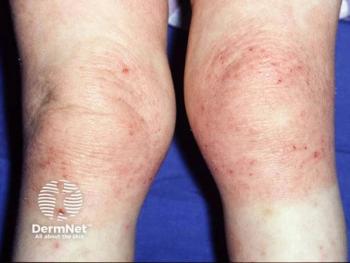
Probiotic Strains Have Potential to Prevent Pediatric AD
Some strains appear to reduce risk in pregnant women and infants.
A new literature review suggests that probiotics may play a role in the prevention of pediatric atopic dermatitis.
The study was led by investigators at the University of the Philippines, who systematically compared the effectiveness of different types of probiotic strains in terms of atopic dermatitis prevention.
“Although studies show promise for the use of probiotics, the evidence is still inconclusive due to significant heterogeneity and imprecision,” they noted.
A Review
The investigators conducted a systemic search using Cochrane Library, MEDLINE, TRIP Database and Centre for Research and Dissemination, which included reference lists and unpublished articles.
The initial screening was performed independently by 2 researchers using cochrane risk of bias tool version 2. If there there was any disagreement on inclusion, consensus was attempted through discussion. A third party would review if consensus could not be reached.
Thus, the team included all randomized controlled trials through April 12, 2020 that evaluated the use probiotics for prevention of atopic dermatitis. These trials compared strains with one another and/or with a placebo.
Furthermore, the primary outcome of interest in all evaluated trials was the development of atopic dermatitis in their patient populations.
“Frequentist network meta‐analysis was conducted using STATA 14 software,” the investigators wrote. “The ranking probabilities and surface under the cumulative ranking curve (SUCRA) values were obtained to determine ranking of the different probiotic strains based on efficacy and safety data.”
The Results
In their analysis, the team included 21 original studies represented by 35 records. Even more, all studies combined included and assessed a total of 5406 children with atopic dermatitis, which was diagnosed by clinicians or according to validated diagnostic criteria.
The top 3 efficacious probiotic preparations were Lactobacillus paracasei ST11 plus Bifidobacterium longum BL999 (Mix8), Lactobacillus paracasei ssp. paracasei F19 (LP), and Lactobacillus rhamnosus GG plus Bifidobacterium animalis ssp. lactis Bb‐12(Mix3).
“Mix8 compared to placebo probably reduces the risk of atopic dermatitis based on low quality evidence (RR = 0.46; 95% CI, 0.25 – 0.85),” noted the investigators.
They also indicated a similar probability for Mix3 as compared with placebo (RR = 0.50; 95% Ci, 0.27-0.94), which was further corroborated by subgroup analyses in infants.
However, there was more uncertainty as to whether LP can reduce the risk of atopic dermatitis (RR = 0.49, 95% CI, 0.20‐1.19).
Also noteworthy was the observation that—according to moderate quality evidence—Lactobacillus rhamnosus compared to placebo was associated with reduced risk in pregnant women and infants.
And finally, the team found that Lactobacillus GG was associated with slightly fewer events compared with placebo based on low quality evidence.
As such, the investigators stressed the promising implications of their findings.
“Certain probiotic preparations demonstrate efficacy in reducing the risk of developing atopic dermatitis when administered to pregnant women, infants, or both,” they concluded.
The study, “
This article was initially published by our sister publication
Newsletter
Like what you’re reading? Subscribe to Dermatology Times for weekly updates on therapies, innovations, and real-world practice tips.











